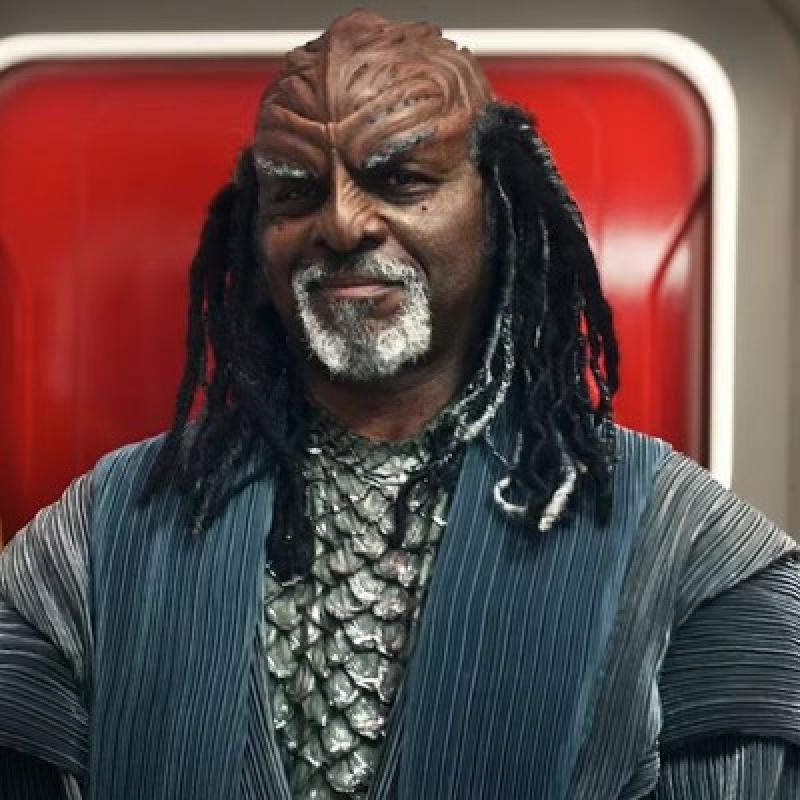Star Trek: Strange New Worlds - S2 E8 - "Under the Cloak of War"

July 27, 2023
'Star Trek: Strange New Worlds' Season 2 Episode 8 Recap: War Makes Monsters of Us All
'Strange New Worlds' shifts gears to take on a political war drama that uncovers old wounds among the crew of the Enterprise.

By Samantha Coley
Star Trek: Strange New Worlds is showing a complete range of episodes with Season 2, as "Under the Cloak of War" shifts gears between the wild and wonderful crossover episode and the upcoming upbeat musical episode to tell a story filled with bloodshed and political intrigue. While Captain Pike (Anson Mount) and several current members of the Enterprise crew missed the majority of the Federation's war with the Klingons, a handful of Starfleet's finest still remember the bloody battles quite vividly.
Written by Davy Perez and directed by Jeff W. Byrd, "Under the Cloak of War" casts a shadow of conflict over the crew of the Enterprise as they're tasked with transporting a Klingon general who defected towards the end of the war and has since sought to become a beacon of peace. While Dak'Rah (Robert Wisdom) presents a calm and kind outward demeanor, M'Benga (Babs Olusanmokun) and Chapel (Jess Bush), both of whom served as medics during the war, remember him very differently as they witnessed firsthand the loss of life he was responsible for.
By the end of the episode, the audience should be left with a very complex set of emotions, Pike and M'Benga stand at opposite ends of the situation at hand with both men operating through the lens of their own personal experiences. While the moral high ground of Pike's point of view is appealing and ideal, as M'Benga notes, there are some atrocities that cannot be forgiven. "Under the Cloak of War" is a stunningly written episode that digs into intense moral quandaries and ambiguities.
The Ready Room





Commander "Buck" Martinez was played by Ron Howard's brother Clint Howard, who played the Tranya drinking alien commander on the TOS episode "The Corbomite Maneuver" when he was 7 years old.
Two episodes ago we heard mention of a "matter synthesizer," and now they've shown a full-blown, canon-breaking drink replicator. According to Memory Alpha, "Replicator technology was not yet employed on starships as late as 2293," which was already past the original series and well into the movie era with the Enterprise-A. For a reference point, Kirk's 5-year mission on the original Enterprise ended in 2270.
M'Benga apparently invented Protocol 12, the super-human-making drug we saw in the season premiere.
And again with the saucer edge windows, this time for a martial arts studio with Klingon weapons on the wall, including some strange-looking bat'leths. I guess that's how they look in this time period. They keep reusing this set, and at this rate they're going to run out of available window spaces on the saucer. Before long we'll be in Voyager's shuttle count territory, lol.
Quite a change in tone from last week, and a little heavy on the personal trauma drama, but an okay episode IMO. I was a little confused by M'Benga claiming to be the Butcher of J'Gal himself, but oh well.
What did you guys think?
I edited and fixed the incorrect time of the end of Kirk's mission above. Somehow I originally entered it as 2370. Only a century off, lol.
I thought the "matter synthesizer" was kinda lazy.
The personal trauma drama angle didn't bother me. I think Trek does it well - this episode, Family in TNG, Extreme Risk in Voyager, etc., when it bothers to address those traumas at all. I think there have been times when character development could have benefitted from more attention paid to the trauma they've undergone, and the aftereffects. It's always seemed a bit unrealistic to me that some have been at war, taken hostage, tortured, brainwashed, and so forth, with seemingly very little psychological trauma resulting in the long run. Characters who have been through something like that are often shown in the next episode, back to regular duty, talking, laughing, and generally acting as if nothing happened. I think that may be why I like story arcs rather than a more stand-alone episodic approach to writing.
This really fleshes out the relationship between M'Benga and Chapel. They've had each other's backs since the series started, and now we see why - they've seen each other in some pretty terrible circumstances, and have been able to count on each other every time the going was rough. He spared her the trauma of having to sacrifice the lives stored in the pattern buffer. That was a heroic act on his part, to my mind. I think that may be why he considers himself to the "Butcher of J'Gal". He still carries the guilt he spared Chapel.
This one reminded me a little of DS9's "Nor the Battle to the Strong", when Jake ended up at that field hospital during a Klingon attack.
Yeah, they can do personal trauma pretty well when they try.
You're right, it does clear up the Chapel and M'Benga relationship.
I thought he meant he was the Butcher because he was the one who killed the Klingon generals? What confused me was that the title didn't fit because he wasn't the one killing civilians and children.
I sort of thought that, too, but I'm not really sure. Between killing the generals, and killing the people saved in the buffer, I'd think killing those who were innocent would be harder to process. But it's never really made clear.